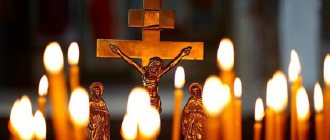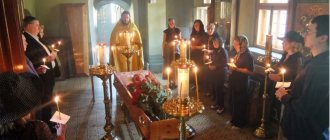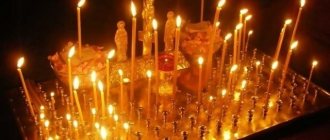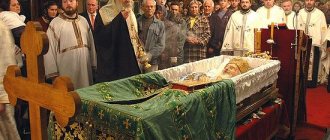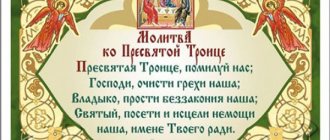In 2022, Radonitsa (parents' day) falls on May 3, the second Tuesday after Easter. This is a special day that evokes reverent feelings for the departed person.
How to remember the deceased on Radonitsa correctly - in church and at home? The very desire to remember and pay tribute to the deceased is quite natural and understandable. It’s no secret that funeral rites exist in all cultures of the world, and they go back to ancient times.
How to properly commemorate the deceased on Radonitsa according to the Orthodox tradition? And what folk customs are not approved by the church? There are detailed answers to these questions - they are discussed below.
How to properly remember the dead
The culture of remembrance is replete with various traditions, beliefs and rituals. Some of them are directly related to the church, including the Orthodox. And there are also others - folk ones, the trace of which has been lost since time immemorial (they are sometimes also called pagan).
If we are talking about how to correctly commemorate the deceased on Radonitsa precisely according to the Orthodox tradition, we can say this. First we come to the service, then we visit the cemetery, and most importantly, we pray and give alms.
Is it necessary to visit the church on Radonitsa
Unfortunately, we cannot always get to church even on the day of Radonitsa, and there are many objective reasons for this. But it’s better to plan your time in advance to attend the service.
It may turn out that our loved one was not Orthodox (and perhaps did not believe in God). But this does not mean that he does not have the right to a blessed memory - the last right of any person.
The only key difference is that for Orthodox Christians in the church they submit a note indicating the name of the deceased. It is enough to write only the name, preferably in the Old Slavonic style. For example, not “Sergei”, but “Sergius”, not “Tanya”, but “Tatiana”, etc.
How to remember and what to do in the temple
The next morning, after the Divine Liturgy, they serve the parents' memorial service. This is a complete commemoration of all deceased baptized Orthodox Christians - the priest remembers all the names that were submitted in the notes (in large churches it is better to bring it the night before). That is why this memorial service is often also called ecumenical, thereby emphasizing the scale of the service: the memory of all believers.
DECEASED OR DECEASED?
It is interesting that the church and many people talk about commemorating the dead, not the dead. And if you think about it, can you find any difference? In fact, this question has a deep, even significant meaning.
It is not entirely correct to call a person dead, and here’s why. According to church ideas, only the body is subject to death, so it can be called dead.
But man himself is a living, immortal soul. This is what Christ proved by his resurrection. Therefore, we commemorate not the deceased, but the deceased loved one - the one who left only for a while.
The question arises: if the deceased is not baptized, is it necessary to attend the service? Everyone can answer it only for themselves. In any case, you need to act according to your conscience, and if there is no sincere desire to visit the temple, then you should not go against your will. Here you can pay attention to general recommendations.
For example, if a person is in a meeting of believers, it is much easier for him to calm his thoughts. This is especially important for those who have recently suffered a bereavement. The doors of the church are open to everyone - why not take advantage of this opportunity on the holy day of Radonitsa?
What not to do
Every year before Radonitsa, the church gives recommendations on how to spend this day correctly. Particular attention is paid to prohibitions due to the fact that many people do wrong:
- First of all, you can't be sad. This holiday is as great as Easter. Therefore, you need to visit cemeteries in a good mood, and you need to greet the deceased with the words “Christ is Risen.” For the departed, the news of the resurrection of the son of God is also good, as it gives them hope for eternal life and a meeting with their loved ones.
- But even in joy there must be restraint. You cannot have noisy parties or drink a lot of alcoholic beverages. It is best to serve a little wine at the funeral dinner, but you should not abuse it.
- It is forbidden to swear and use foul language on this day, as this upsets the deceased. They become anxious when they feel a negative environment.
- Interestingly, the church prohibits leaving food for the dead and burning candles on graves. Before leaving the cemetery, it is recommended to extinguish the candle and take away all food. There are several reasons for this: food attracts homeless people who litter on graves and behave disrespectfully. Candles often cause fires.
- It is best to clean the churchyard in advance; the bustle on this day can disturb the dead. It is best to just decorate the grave with artificial flowers on Radonitsa.
On this day, you should behave modestly and respect the dead, remembering them only with kind words.
How to behave in a cemetery
It is quite clear how to remember the dead on Radonitsa in church. Another thing is how to do this in a cemetery? On Parents' Day, it is customary to visit the grave and restore complete order there.
It might even be better to arrive the day before. Especially when there is a lot of work to be done - replacing or painting a fence, painting a cross, clearing a mound of grass, laying an artificial lawn, washing a monument, etc.
However, the actual commemoration of deceased loved ones is not allowed before the second Tuesday after Easter - i.e. exactly to Radonitsa. According to Orthodox tradition, as you approach the grave, you need to light a candle, and then read an akathist or prayer, as your heart dictates.
Whether a person does this mentally or out loud is his business. Again, the main thing is sincerity and personal desire. Well, after prayer, you can restore complete order in the place and stay a little in silence.
Sorrowful feelings overwhelm you at such moments - the bitterness of loss, perhaps even resentment, a mental wound. But the world is not black and white, and there are an infinite number of different tones and halftones in it.
The light wave of Radonitsa also undoubtedly makes itself felt. Man is immortal, and one day he will be resurrected.
Of course, we should not indulge in immeasurable sorrow - life is stronger than death, and Christ showed this long ago. Such a bright echo of Easter makes itself felt even in these moments.
Time and features of church service
The service on Radonitsa is especially solemn
Starting from the last weeks of Great Lent and up to St. Thomas Week, no funeral services are held in the church. Strictly speaking, at this time - and especially during the 9 days from Easter Sunday - it is considered in principle unacceptable to perform actions related to death: reading funeral prayers, tidying up graves, commemorating... Easter, which embodies the triumph of life, does not fit in. with sad thoughts that invariably evoke sorrowful activities.
But after this period, the dead are paid tribute at the Great Requiem Service, which not only remembers those who have passed on to another world, but also, as it were, includes them in the circle of the living, calls on them to take part in the most important holiday for Christians, emphasizing: separation is temporary, but the future life is infinite.
There are two services dedicated to this event.
The first takes place on Monday, which is logical if you remember: in the church time system, the day begins not in the morning, but in the evening. So parishioners who do not have the opportunity to join the service during Radunitsa itself can do so with peace of mind the day before at the end of the working day, since that is when the holiday begins.
Memorial services are allowed to be celebrated on Monday of St. Thomas Week
However, in recent years, the leadership of many regions in Russia has been meeting the believers halfway and declaring Tuesday of St. Thomas Week an official day off, so most Christians try to take part in the second and main solemn service in the church - in the morning on Radonitsa. It begins, as it should be, with the Liturgy, and ends with the Great Requiem Service, at which the priest, in particular, lists the names of the deceased given to him on pieces of paper, praying for their souls together with the friends and relatives present in the church.
If this year you are thinking about attending a memorial service for the first time, keep in mind: exactly what time the service in the church will begin on Radonitsa depends on the charter and customs of the individual church. To avoid getting into trouble, check the schedule of services in advance - fortunately, nowadays almost every church has a page on the Internet.
How to properly remember the dead: prayer
People often wonder whether it is necessary to pray for the dead? After all, they are no longer with us, and is there any benefit to them from our remembrance? The answer here is unequivocal - yes, it is absolutely necessary to pray, give alms, and remember a loved one.
It may seem that we are doing this as if for ourselves - to console ourselves and take our minds off sad thoughts. If there is some truth in this, then so be it.
But our commemoration also has meaning for the soul of the deceased. The fact is that this is the only channel that connects a person with the other world.
We, for example, pray to Christ, who has not physically been on earth for almost 2000 years. But we firmly believe that his spirit is alive - we communicate with him.
You cannot communicate directly with the dead, but you can say a prayer for them almost any day and at any time. When we remember the deceased, it means that we are trying to help his soul.
And of course, the main attention should be paid to the spiritual, which is understandable even on an intuitive level. The church also teaches this.
What prayers for the dead should you read?
Also, the question of how to correctly remember the dead on Radonitsa is also connected with specific prayers that are said in the cemetery, in church or at home (as the heart tells you). Here are some examples of exactly how you can pray.
Rest, O Lord, the souls of Your departed servants: my parents, relatives, benefactors (their names) and all Orthodox Christians, and forgive them all sins, voluntary and involuntary, and grant them the Kingdom of Heaven.
Here's how to pray for children for their deceased parents: Children's prayer for deceased parents
And this is how parents pray for their deceased children: Prayer of parents for deceased children
And this is how they pray for those killed in the line of military duty: Prayer for the repose of Orthodox soldiers
Here is another example of a funeral prayer - A widower’s prayer for his wife
And this is how a widow prays for her deceased husband
Of course, a person can pronounce his own words. There is no sin in the fact that everyone will pray exactly as he feels. There are no “wrong” prayers – there are only a sincere heart and our conscience.
How to remember non-believers and suicides
This is another very delicate issue related to how to remember the deceased on Radonitsa. Of course, these two groups of people cannot in any way be combined into one.
Fates turn out differently: can anyone blame a person for having different views? And who among us knows how hard it was for someone who once committed suicide?
Therefore, the church teaches that although it is impossible to submit notes for non-believers, as well as suicides, it is possible and necessary to pray for them. And also - to give alms.
Here it is important to understand that with such actions we not only remember a person, but also help his immortal soul, which is impossible to lose. Yes, maybe someone led a not entirely righteous life, and sin led him away from God. But this does not mean that the person disappeared into oblivion. His soul is alive, which means we can and should remember its blessed memory.
Prayer for a suicide
For those who voluntarily departed this life, they pray like this (Prayer for a suicide from the Venerable Elder Leo of Optina):
“Have mercy, O Lord, on the soul of Thy servant (thy servant) (name), who departed into eternal life in apostasy from Thy holy Orthodox Church. Your destinies are unsearchable. Do not make this my prayer a sin for me. But Thy holy will be done.”
The holy elders also recommended turning to the Mother of God more often with requests for help for a suicide and reading the prayer “Virgin Mother of God, rejoice...” (as many times as you can: from 30 to 150 times a day). At the beginning and at the end of this rule they add a request to the Mother of God for help to the soul of a deceased person.
Prayer for the repose of an unbaptized person
For those who died unbaptized or without repentance (or excommunicated from the church), they pray to the Venerable Saint Paisius: Prayer for the easing of eternal torment for those who died without repentance
Prayer for Radonitsa - for all people
You can and should pray for all people. Christ repeatedly taught that God does not have “extra” people - he forgave the sins of all those in need, without discriminating between individuals.
One day the Savior said:
“Him that comes to me I will never cast out” (John 6:37).
This suggests that in divine eyes there are no people on whom you can simply put a cross and say: “fallen.” This is why prayer and almsgiving are ways of remembrance that can be applied to ALL people.
Widower's Prayer
Christ Jesus, Lord and Almighty! In contrition and tenderness of my heart, I pray to You: rest, O Lord, the soul of Your departed servant (name), in Your Heavenly Kingdom. Lord Almighty! You blessed the marital union of husband and wife, when you said: it is not good for man to be alone, let us create for him a helper for him. You have sanctified this union in the image of the spiritual union of Christ with the Church. I believe, Lord, and confess that You have blessed me to unite me in this holy union with one of Your handmaids. By your good and wise will you deigned to take away from me this servant of yours, whom you have given to me as a helper and companion of my life. I bow before Your will, and I pray to You with all my heart, accept my prayer for Your servant (name), and forgive her if you sin in word, deed, thought, knowledge and ignorance; Love earthly things more than heavenly things; Even if you care more about the clothing and decoration of your body than about the enlightenment of the clothing of your soul; or even careless about your children; if you upset anyone by word or deed; If there is a grudge in your heart against your neighbor or condemn someone or anything else you have done from such evil people. Forgive her all this, for she is good and philanthropic; for there is no man who will live and not sin. Do not enter into judgment with Thy servant, as Thy creation, do not condemn her to eternal torment for her sin, but have mercy and mercy according to Thy great mercy. I pray and ask You, Lord, to grant me strength throughout the days of my life, without ceasing to pray for Your departed servant, and even until the end of my life to ask her from You, the Judge of the whole world, to forgive her sins. Yes, as if You, God, placed a crown of stone on her head, crowning her here on earth; Thus crown me with Thy eternal glory in Thy Heavenly Kingdom, with all the saints who rejoice there, so that together with them He may forever sing Thy all-holy name with the Father and the Holy Spirit. Amen.
How to give alms correctly
And of course, almost everyone knows that the best way to remember is to give alms. Here many questions arise at once: how, to whom to submit what?
First of all, you can share with those people who really need help. It is unlikely that your mercy will benefit a wealthy person - he is already blessed with everything he has.
But it would be nice to pay attention to elderly people, orphans, single women with children. What if they have lost faith in good deeds and think that life is a continuous struggle without bright spots?
You can serve it to both friends and strangers. Moreover, alms can be understood as more than just a coin in a glass or a gift of eggs.
In fact, this is any help, a good deed that really helps a person. For example, if a relative died of alcoholism, why not help the person suffering from this disease? Perhaps this will be the first step towards recovery - then you will become a second parent for such a person.
Should I serve it to dubious people? - Father's comment
Often people do not give alms because they are worried that it will be used for harm - simply spent on alcohol. The priests believe that anyone can make a donation. If you suspect that he is simply misusing your kindness, give gifts of food and other necessities.
Saint John Chrysostom speaks about the benefits of commemoration through alms:
There are, there are, brethren, means to alleviate the torment of a sinner’s soul, if we want. If we make frequent prayers for him, if we give alms, then even if he was not worthy of God’s mercies, we will beg God.
If He saved others for the sake of Paul, if for the sake of others He spared many, how can He not do the same for our sake? From his estates, from your own acquisitions, wherever you please, help. The more sins your brother is guilty of, the more he demands alms for himself.
Alms can be of various types—money, food, or distributing the clothes of the deceased to the poor.
Diligent help to your neighbors and people around you also appeases our Lord Jesus Christ and is imputed to Him as alms for the deceased.
Here, for example, is the commentary of Priest Alexei Shlyapin, rector of the Church of the Great Martyr Demetrius of Thessaloniki (village of Ivakino, Mozhaisk district, Moscow region:
THIS IS INTERESTING
Another Archbishop of Constantinople, John Chrysostom, who lived in the 4th-5th centuries. AD, said that prayer and alms are much more beneficial for the deceased than his luxurious burial. Of course, there is no sin in the fact that the relatives of the deceased found the desire and opportunity for the funeral to take place with dignity. But the most important thing is spiritual help to the departed soul.
“Luxurious burial is not love for the deceased, but vanity. If you want to sympathize with the deceased, I will show you another method of burial and teach you to lay out vestments, decorations worthy of him and glorifying him: this is alms.”
What holiday is it. Meaning and meaning in Christianity
Every year, a week after Easter, believers begin preparing for the Day of Remembrance of their Ancestors. Let's figure out what Radonitsa is in Orthodoxy. The connection of the name of the celebration with joy may seem strange, because the cemetery first of all evokes in every person sad associations associated with irreparable losses.
According to church traditions, the laity bring the great Easter joy of the resurrection of the Savior to loved ones who have left the sinful earth. This means that hope arises in their souls that every deceased person finds another life in heaven. From year to year, the ancient Slavs commemorated their dead with faith and hope for the best. Radonitsa's roots go back to the distant past, establishing a strong and unbreakable connection with our ancestors.
The history of the celebration is connected with the fact that on the day of remembrance in Orthodox churches the singing of funeral lithiums is resumed. There is a rule that their reproduction is stopped on Maundy Thursday and is not carried out until the onset of Radonitsa. Also at this time, lay people should not visit the cemetery; there are special days for this.
What not to do on Radonitsa
We can find not many everyday situations when the church takes a fairly definite, even categorical position on the prohibitions of certain actions. The case of Radonitsa fits this description completely. Yes, we know quite a lot of popular ideas about the “correct” funeral, but Christian views here are significantly different.
Food and vodka at the cemetery
Orthodoxy does not consider it necessary to organize a funeral, as is customary among the people, with the help of food and alcohol, which are brought and placed at the grave. This tradition has long-standing pagan and partly Soviet roots - back then, at the burial site of fallen soldiers, a cut glass of vodka was placed, on which a piece of bread was placed. There is nothing reprehensible in this gesture itself, because people express their respect in this way - they remember a loved one.
On the other hand, it is no secret that if a glass is poured, someone will certainly drink it. Perhaps the person who poured the alcohol will drink it himself, and after the memorial, a stranger may even look at the grave. In addition, dogs or worse, rats may come running to eat.
It turns out that we are trying to act from the bottom of our hearts - to remember the person, to pay our last tribute to him. But the consequences of using food and especially alcohol (and strong alcohol) at the grave do not quite correspond to our noble goal.
However, this does not make it impossible to donate all the food to those in need, who may also be at the cemetery. Give the eggs and papa to any person, as your heart tells you. Perhaps he himself will ask about it, or maybe everything will be clear without words - this is the most convenient situation.
There are no specific recommendations or rules here, there is only one condition: alms are given from a pure heart. And of course, we are not talking about alcohol. We are talking about a person in need, about his urgent need. And alcohol, whatever one may say, is a false need, something without which it is quite possible to live healthy and happy, and even more so on the day of Radonitsa.
Official representatives of the Orthodox Church willingly share their point of view on how to properly commemorate the deceased on Radonitsa. The priests are unanimous that the tradition of commemoration with alcohol and leaving food at the grave has nothing to do with Orthodoxy.
Therefore, if there is a desire to correctly remember a deceased person, then it would be wise to listen to the point of view of the Orthodox Church.
Features of holding parent's day in different regions
Each country and region remembers the dead in its own way. The approach of the authorities to parent's day and the traditions adopted in a particular area differ. Let us cite, as noted by Radonitsa, the customs of different regions:
- In the Smolensk region, on the morning of this day, the family was required to attend a church service (now this tradition is not observed by everyone). A special feature in this region is the funeral lunch, which includes colored eggs, porridge, pancakes or flatbread. Vodka was usually the drink of choice. The funeral dinner is held there exclusively at the graves of the deceased.
- In the northeastern Russian regions, villages have preserved the custom of heating a bathhouse for deceased relatives. It should be well heated, towels and other washing supplies should be placed in it. On this day, living people should not visit it; it is not even recommended to open the door to the bathhouse. According to legend, on Wednesday morning you can find traces of those who visited the steam room; they remain in the ashes.
- In Kuban, the Orthodox holiday of Radonitsa is a very important day, which the authorities make a day off. But the most interesting thing is that people go to the cemetery in this region twice in the spring - on Easter and Parents' Day. This contradicts church canons, but is still firmly entrenched in the minds of Kuban residents. The tradition of visiting the churchyard on a bright Easter day is associated with the actions of the authorities in Soviet times. At that time there was persecution against the church, so on Easter people gathered in cemeteries and services were held there. The second reason for the emergence of such a tradition was that the day off for Radunitsa was canceled, so people went to the funeral on Easter Sunday.
- In Chernigov, it is customary to leave crumbs and water on the windowsill for the deceased; some families set out entire dishes. It is believed that souls visit the homes of living people on this day, so they definitely need a treat.
- In Kostroma and Tula, it is important that it rains on Radonitsa. If there was no precipitation, then in the afternoon the children began to call out to him. They were often joined by old people who asked the sky for rain. If it started, then all the residents poured out into the street and tried to get more wet. It was believed that it attracts happiness.
- In Siberian villages you can still find the tradition of covering the threshold with spruce branches. It is believed that they will not let through souls who come with bad intentions.
In cities, some of the listed traditions are no longer observed; mainly such rituals have been preserved in small settlements and villages. They are observed methodically in areas where many old people live.
How to properly remember the dead at home
This is another question that is often asked in connection with how to correctly commemorate the deceased on Radonitsa. Of course, the custom of arranging a funeral table, at which alcohol is also present, lives and will obviously live for a long time. It often happens that people start drinking vodka at the grave, after which they continue drinking it at home.
Of course, a strong drink relaxes a person. As a result, whether he wants it or not, control over himself begins to gradually weaken. Situations can be all sorts of things - someone will say too much, someone will react to the remark with some offense.
Of course, these are imaginary situations, but they can also become real. Not to mention that alcohol makes both body and soul happy. And this energy certainly completely contradicts the mournful day of Radonitsa.
The world of the living and the world of the dead are separated by a barrier, but one day each of us will overcome it. This eternal law of nature can be approached in different ways. However, in any case, the immortal essence of a person, that same indestructible particle continues to live. Its name is soul.
And we remember her exactly, both on Radonitsa and on other days, as our hearts tell us. And in order not to darken the memory of the deceased, let us act in a Christian and, if you like, humane way: this is the main answer to the question of how to correctly remember deceased relatives.
Parents' prayer for deceased children
Lord Jesus Christ, our God, Lord of life and death, Comforter of the afflicted! With a contrite and tender heart I run to You and pray to You: remember. Lord, in Your Kingdom your deceased servant (your servant), my child (name), and create for him (her) eternal memory. You, Lord of life and death, have given me this child. It was your good and wise will to take it away from me. Blessed be Thy name, O Lord. I pray to You, Judge of heaven and earth, with Your endless love for us sinners, forgive my deceased child all his sins, voluntary and involuntary, in word, in deed, in knowledge and ignorance. Forgive, O Merciful One, our parental sins as well, so that they may not remain on our children: we know that we have sinned many times before You, many of whom we have not observed, and have not done, as You commanded us. If our deceased child, ours or his own, for the sake of guilt, lived in this life, working for the world and his flesh, and not more than You, the Lord and his God: if you loved the delights of this world, and not more than Your Word and Your commandments, if you surrendered with the pleasures of life, and not more than with contrition for one’s sins, and in intemperance, vigil, fasting and prayer have been consigned to oblivion - I earnestly pray to Thee, forgive, most good Father, all such sins of my child, forgive and weaken, even if you have done other evil in this life . Christ Jesus! You raised up the daughter of Jairus through the faith and prayer of her father. You healed the daughter of the Canaanite wife through faith and the request of her mother: hear my prayer, and do not despise my prayer for my child. Forgive, Lord, forgive all his sins and, having forgiven and cleansed his soul, remove eternal torment and dwell with all Your saints, who have pleased You from the ages, where there is no sickness, no sorrow, no sighing, but endless life: like there is no man like He will live and will not sin, but You are the only One besides all sin: so that when you judge the world, my child will hear Your most beloved voice: come, blessed of My Father, and inherit the Kingdom prepared for you from the foundation of the world. For You are the Father of mercies and generosity. You are our life and resurrection, and we send glory to You with the Father and the Holy Spirit, now and ever and unto ages of ages. Amen.
How to properly celebrate Radonitsa
The very understanding of what kind of holiday Radonitsa is largely answers the question of how to properly celebrate parent’s day. It just so happened in the centuries-old history of the people that the commemoration of the dead is associated with a variety of traditions.
Some of them are directly related to Orthodoxy, while others are associated with pagan roots. To understand this issue, you should learn to distinguish one from the other well - especially since it is quite simple to do this.
The culture of remembrance is replete with various traditions, beliefs and rituals. Some of them are directly related to the church, including the Orthodox. And others are folk, the trace of which has been lost since time immemorial (they are sometimes also called pagan).
If we are talking about how to correctly remember the deceased on Radonitsa precisely according to the Orthodox tradition, we can say this: we come to the service, visit the cemetery, and most importantly, we perform prayer and alms.

